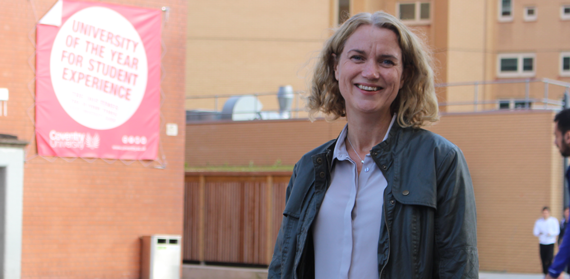Guest post by Kate Broadhurst, Centre for Business in Society
A bit about me
I have taken on a PhD later in life than some but having worked in and around academia all my working life, completing a PhD has always been a goal. I even registered for a PhD in the mid 1990s when I first graduated and started out as a researcher at Leicester University. Twenty years, five jobs, two marriages, one divorce and 1 kid later I have finally committed to the PhD. With a pre-schooler at home I had the misguided view that the PhD would afford me greater flexibility, more time at home and the opportunity to truly focus on a topic rather than juggle a variety of tasks. So having been awarded a studentship I left my role as Head of Enterprise Development at Northampton University last summer, and am now a full-time student with the Centre for Business and Society (CBiS).
A bit about my research
I have always been interested in how partnerships function and most recently in my role at Northampton I worked with a variety of local partners (university, big and small business, public and voluntary sector) to drive economic growth across the county and address areas of under development and low skills.
Partnership has been a dominant force in this country since the 1990s and is set to continue. In 2010 the Coalition Government laid out their plan for economic growth by introducing Local Enterprise Partnerships (LEPS) which marked a shift from centralised government to local communities, authorities and businesses. My research explores this decentralisation of policy and questions whether sustainable growth is supported by a local partnership approach. In short whether Aristotle’s view that ‘the whole is greater than the sum of its parts’ holds true for LEPs. As yet, no study has applied the theory of partnership to LEPs to this extent which is exciting for me.
How’s it going so far?
So I am now one year into my journey and I am thoroughly enjoying the ride. I have a great Director of Studies and Supervisory Team who I meet regularly. The University’s Postgraduate Research Support Team provide a clear Curriculum Framework that helps you work towards set milestones which is excellent at ensuring you maintain progress. With that structure in place it’s then for you to decide how to work best at achieving the goal of getting a PhD. So I do have that flexibility I was hoping for and I can also choose to work when and where suits me best. Although I have learnt that working from home on days that he is around best avoided.
CBiS has shared workspaces for PhD students and runs a great seminar series. The Postgraduate Research Support Unit also keep you up to date on the workshops, events and seminar that are going on and so I aim to get involve in those activities as well which helps reduce the sense of solitary working that is inevitable when undertaking a PhD and it’s great to hear about others’ research experiences.
My Top Tips
So one year on and I still feel it was the right decision, and I am loving the journey and am determined to complete within the three-year studentship. Afterwards, who knows. I love research and teaching so an academic post appeals but not before I have taken the family on that road trip I promised!
I will leave you with a few pearls of wisdom to making a good start with your PhD:
- Get your head around the Curriculum Framework early. It is there to help you keep focused and on track.
- Time spent planning in the early days is time well spent so create some form of plan for the three-year research study early on. I made a simple Gantt chart that is already in version 5 and from that I have developed more detailed plans for key phases (e.g. data collection).
- Get a balance of focused study on your topic with engagement in the wider activities in your Faculty and research area.
- Think about how you are going to engage in research seminars and conferences now so you gain experience of giving presentations and writing for publication early on.
- Start writing early – everyone will tell you this but it really does help.
- Make the best use of your supervisory team – find about about their skills, contacts, expertise and don’t be afraid to give them some direction in terms of how they can support you. That’s what they are there for after all.




Comments are disabled